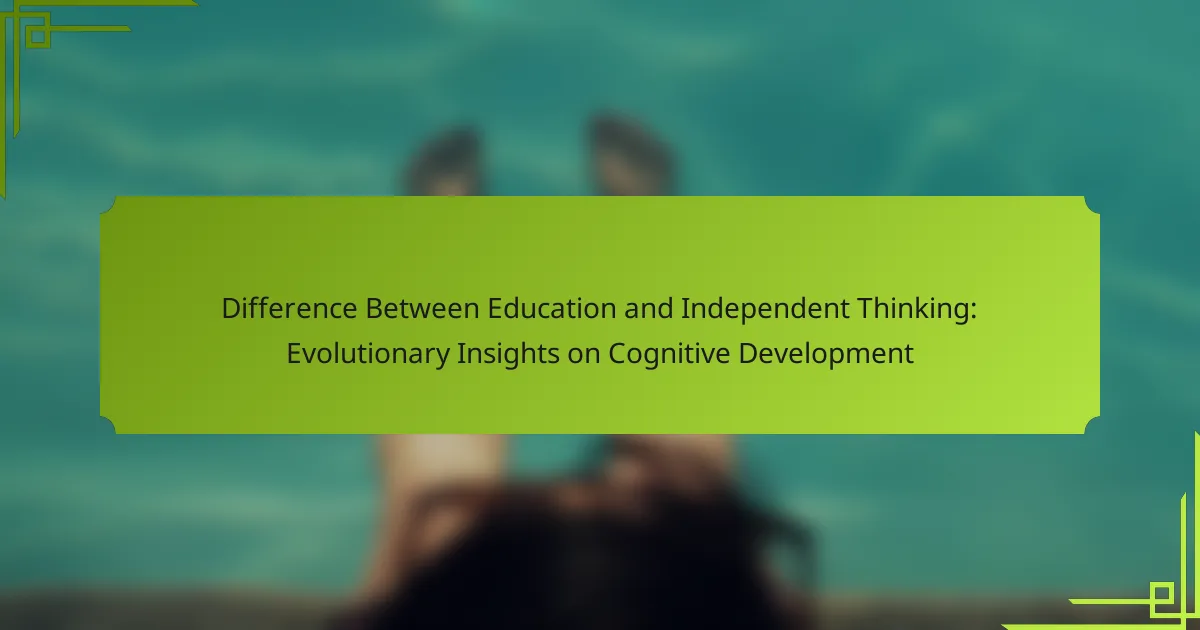Understanding the difference between education and independent thinking is vital for cognitive development. Education enhances critical thinking and problem-solving skills through structured learning. In contrast, independent thinking fosters creativity and personal insights through self-directed exploration. This article explores their interconnection, the unique attributes that distinguish them, and strategies to promote independent thought within educational settings.
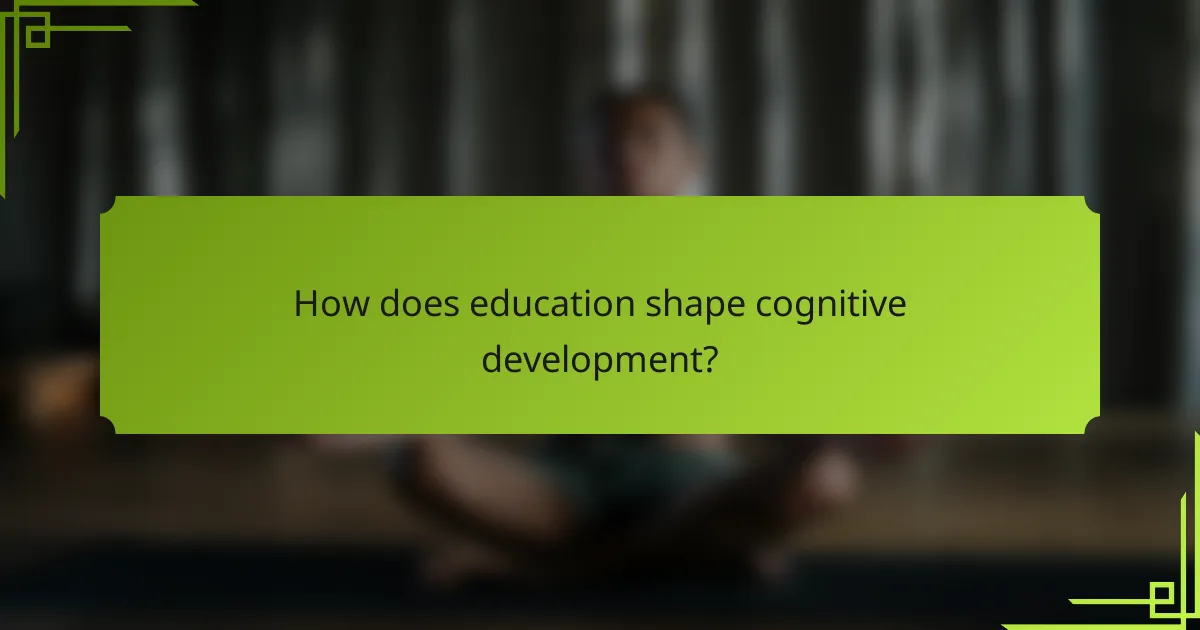
How does education shape cognitive development?
Education significantly enhances cognitive development by fostering critical thinking and problem-solving skills. It provides structured learning environments that promote knowledge acquisition and intellectual growth. Research indicates that formal education influences brain development, particularly in areas responsible for reasoning and decision-making. This structured learning contrasts with independent thinking, which often relies on personal experiences and self-directed exploration. While both approaches contribute to cognitive development, education tends to offer a more systematic framework for understanding complex concepts and encourages collaborative learning, thereby enriching cognitive processes.
What are the fundamental principles of education in cognitive growth?
Education fundamentally promotes cognitive growth by fostering critical thinking, problem-solving, and creativity. Key principles include active engagement, scaffolding knowledge, and encouraging metacognition. Active engagement allows learners to interact with concepts, enhancing retention. Scaffolding knowledge provides structured support that gradually increases in complexity, enabling deeper understanding. Encouraging metacognition empowers learners to reflect on their thinking processes, leading to improved self-regulation and independent thought. These principles collectively nurture an environment where cognitive development can thrive.
What role does formal education play in shaping independent thinking?
Formal education significantly influences independent thinking by providing foundational knowledge and critical thinking skills. It fosters analytical abilities, enabling individuals to evaluate information critically. This structured learning environment encourages questioning norms and developing personal viewpoints. Over time, education evolves, adapting to new cognitive development insights, allowing for greater autonomy in thought processes.
What are the stages of cognitive development influenced by education?
The stages of cognitive development influenced by education include sensorimotor, preoperational, concrete operational, and formal operational stages. Each stage reflects a unique way of thinking shaped by educational experiences. Education enhances cognitive abilities at each stage, promoting critical thinking and problem-solving skills. For example, in the concrete operational stage, education fosters logical reasoning through hands-on learning. As a result, educational interventions can significantly impact cognitive development across all stages.
How does the curriculum impact critical thinking skills?
The curriculum significantly influences critical thinking skills by shaping the learning environment and content. A well-structured curriculum encourages inquiry, analysis, and problem-solving, fostering independent thought. Research shows that curricula emphasizing active learning and real-world applications enhance cognitive development. Such approaches yield higher engagement and retention rates, ultimately cultivating robust critical thinking abilities.
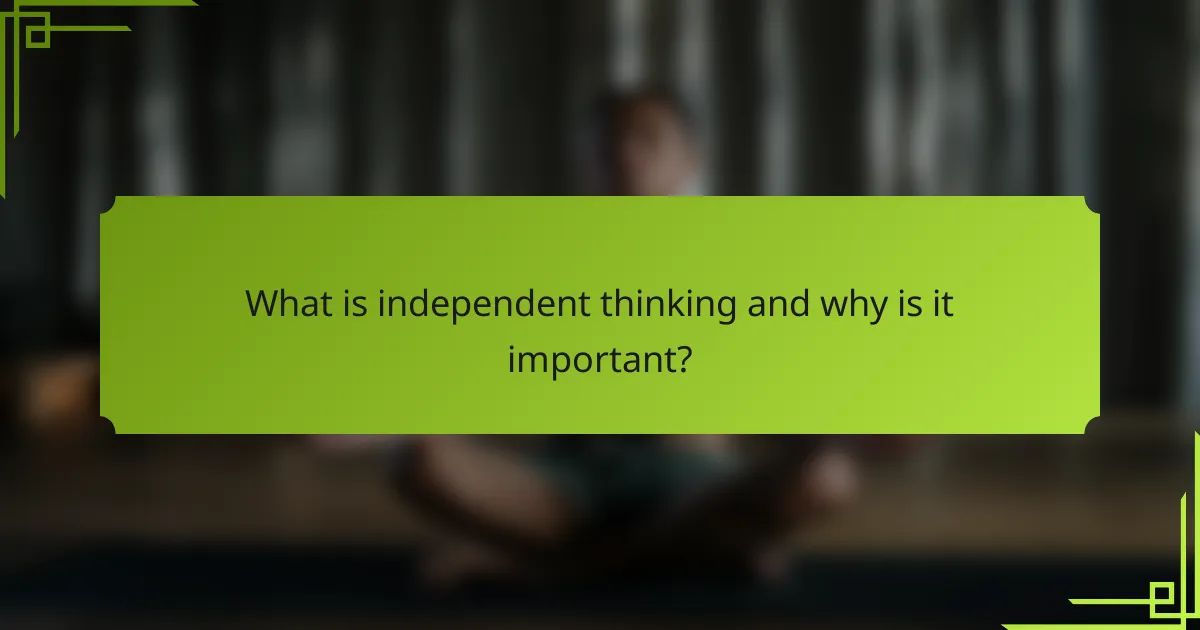
What is independent thinking and why is it important?
Independent thinking is the ability to analyze information and form judgments independently. It is crucial for personal development and problem-solving. Education often emphasizes rote learning, whereas independent thinking fosters creativity and critical analysis. This cognitive evolution enhances decision-making skills and adaptability in complex situations. Encouraging independent thought leads to innovative solutions and personal empowerment.
How does independent thinking differ from traditional educational methods?
Independent thinking emphasizes creativity and problem-solving, contrasting with traditional educational methods that prioritize rote memorization and standardized testing. Independent thinking fosters critical analysis, encouraging students to explore diverse perspectives. Traditional methods often limit engagement, focusing on compliance and uniformity. This evolution in cognitive development highlights the need for educational systems to adapt, promoting skills essential for modern challenges. As a result, educators increasingly integrate independent thinking into curricula, preparing students for real-world complexities.
What are the psychological benefits of fostering independent thinking?
Fostering independent thinking enhances problem-solving skills, creativity, and self-confidence. These psychological benefits empower individuals to make decisions and face challenges effectively. Independent thinkers often exhibit greater resilience, enabling them to cope with stress and adapt to change. This cognitive development nurtures a sense of autonomy and personal responsibility, fostering lifelong learning.
How does independent thinking contribute to problem-solving abilities?
Independent thinking enhances problem-solving abilities by fostering creativity and adaptability. It encourages individuals to analyze situations from multiple perspectives, leading to innovative solutions. This cognitive flexibility is a unique attribute that distinguishes independent thinkers, allowing them to navigate complex challenges effectively. By relying on their judgment rather than conventional methods, they can identify and implement effective strategies tailored to specific problems.
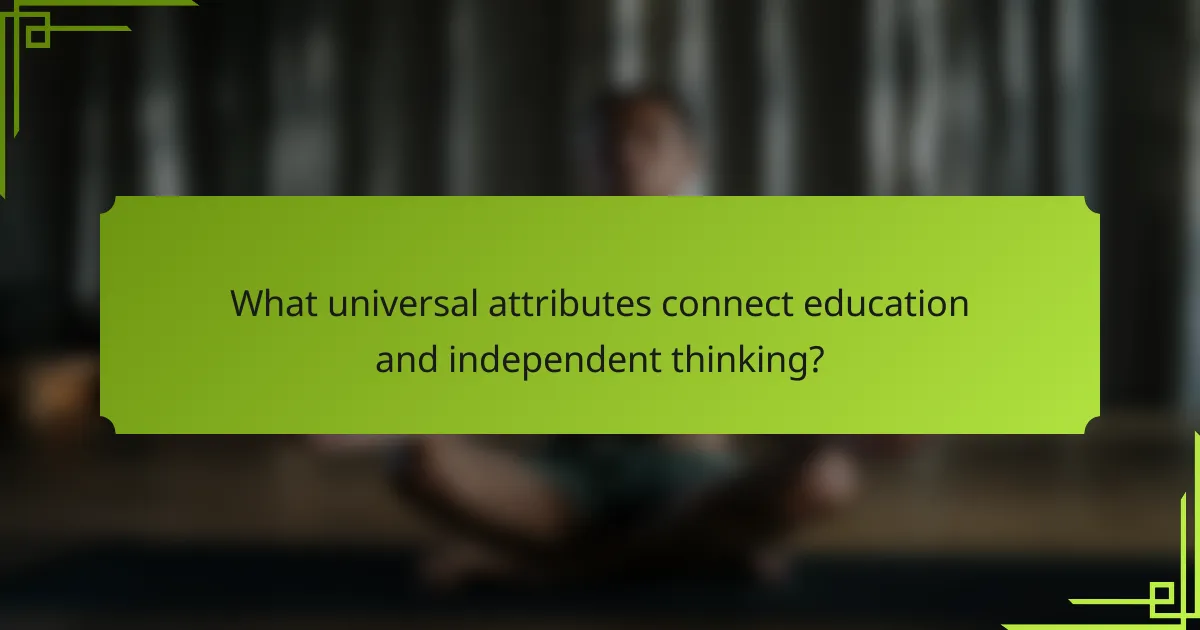
What universal attributes connect education and independent thinking?
Education and independent thinking are interconnected through critical thinking, problem-solving, and creativity. Both promote cognitive development by encouraging analysis and synthesis of information. Education provides foundational knowledge, while independent thinking fosters personal insights and innovative solutions. Together, they enhance adaptability and lifelong learning, essential traits in an evolving world.
How do cognitive biases affect both education and independent thinking?
Cognitive biases can hinder objective analysis in education and independent thinking. They often lead to flawed reasoning and reinforce preconceived notions, impacting decision-making. For example, confirmation bias may cause individuals to favor information that supports their existing beliefs, limiting critical evaluation. This can stifle creativity and discourage diverse perspectives, essential for effective learning and independent thought. As a result, understanding these biases is crucial for fostering a more open-minded educational environment and enhancing cognitive development.
What common educational strategies promote independent thought?
Encouraging independent thought in education involves strategies like critical thinking exercises, collaborative learning, and inquiry-based projects. These methods foster autonomy and enhance cognitive development. Critical thinking exercises challenge students to analyze and evaluate information, promoting deeper understanding. Collaborative learning encourages peer interaction, allowing students to share diverse perspectives. Inquiry-based projects empower learners to explore topics of interest, cultivating curiosity and self-directed learning.
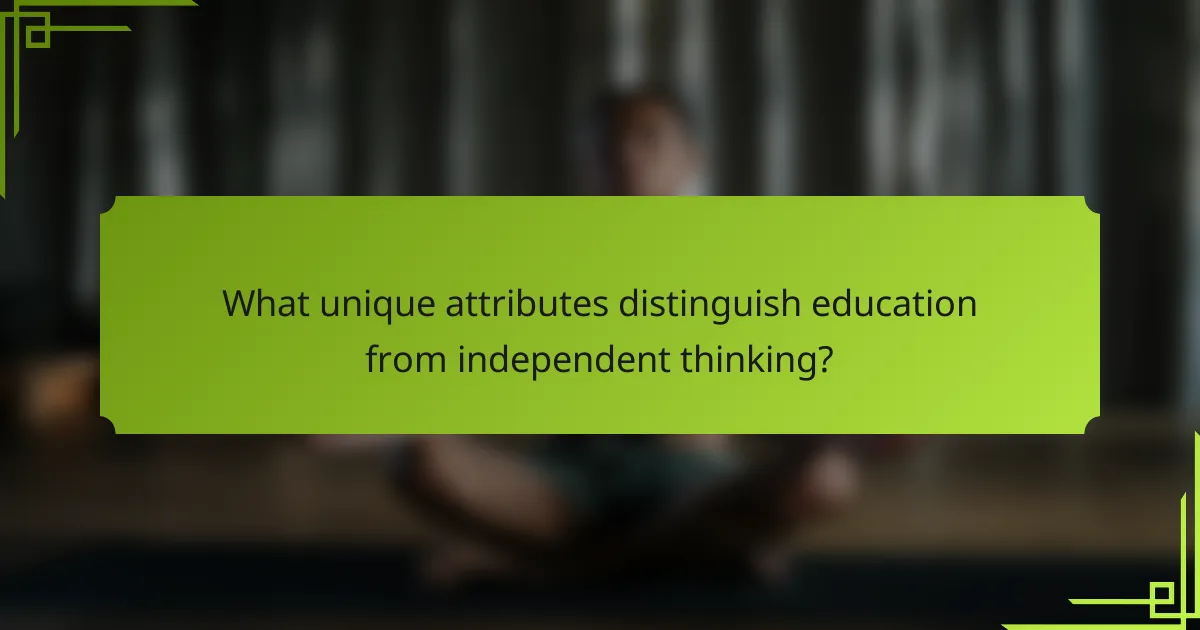
What unique attributes distinguish education from independent thinking?
Education primarily focuses on structured knowledge acquisition, while independent thinking emphasizes personal reasoning and creativity. Unique attributes distinguishing them include education’s reliance on formal curricula and standardized assessments, contrasting with independent thinking’s emphasis on self-directed exploration and critical analysis. Education often fosters conformity, whereas independent thinking encourages innovation and individual perspectives. This divergence shapes cognitive development, with education providing foundational knowledge and independent thinking nurturing problem-solving skills.
How do cultural differences influence educational approaches to independent thinking?
Cultural differences significantly shape educational approaches to independent thinking. These differences influence how critical thinking and creativity are fostered in various educational systems.
Cultural values impact teaching methods. For instance, collectivist cultures often prioritize group harmony and consensus, which may limit individual expression. In contrast, individualistic cultures encourage personal opinions and independent thought, promoting self-directed learning.
Educational systems also reflect cultural expectations. In some cultures, rote memorization is valued, potentially stifling independent thinking. Others emphasize inquiry-based learning, allowing students to explore and question, enhancing cognitive development.
As a result, understanding these cultural influences is crucial for educators. Tailoring approaches to align with cultural contexts can foster more effective independent thinking skills in students.
What unique teaching methods encourage independent cognitive development?
Unique teaching methods that foster independent cognitive development include inquiry-based learning, project-based learning, and Socratic questioning. These approaches emphasize critical thinking and problem-solving skills. Inquiry-based learning encourages students to ask questions and explore topics deeply, promoting self-directed learning. Project-based learning involves students in real-world projects, enhancing their ability to apply knowledge independently. Socratic questioning stimulates reflective thinking, guiding students to develop their reasoning skills. Each method uniquely contributes to cognitive growth by allowing learners to take ownership of their educational journey.
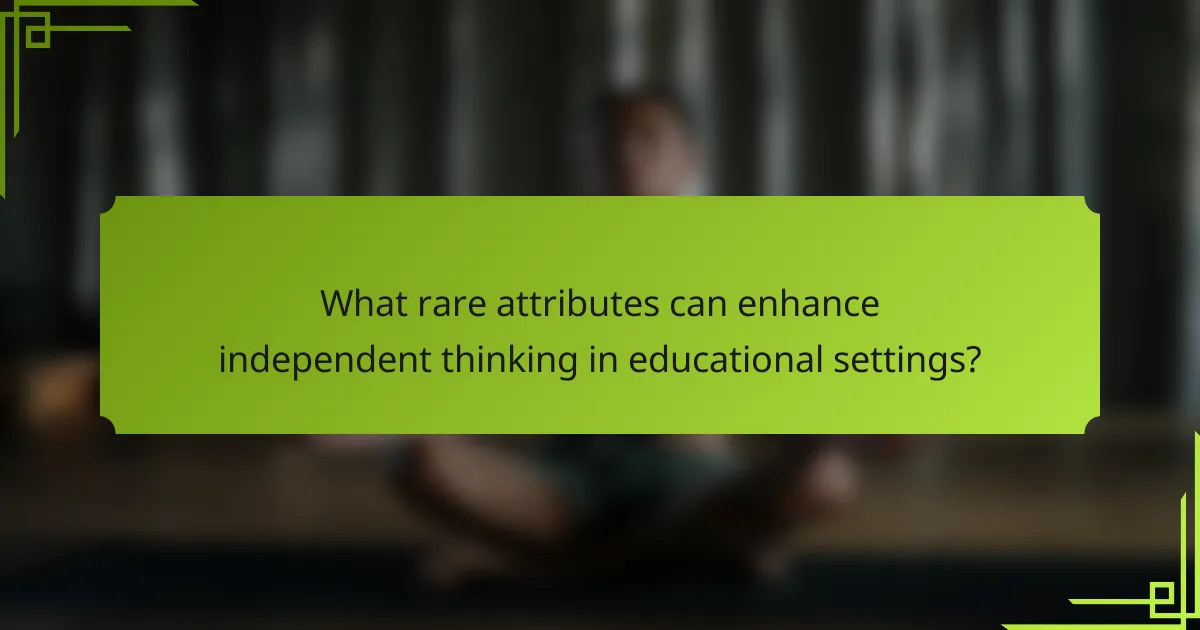
What rare attributes can enhance independent thinking in educational settings?
Encouraging independent thinking in educational settings can be enhanced by fostering rare attributes such as curiosity, adaptability, and metacognition. Curiosity drives students to seek knowledge beyond the curriculum, while adaptability allows them to adjust their thinking based on new information. Metacognition empowers learners to reflect on their thought processes, improving problem-solving skills. Integrating these attributes into educational practices can significantly enhance cognitive development and promote independent thinking.
How can experiential learning foster rare independent thinking skills?
Experiential learning enhances rare independent thinking skills by promoting active engagement and reflection. This method encourages learners to analyze real-world situations, fostering critical thinking and problem-solving abilities. As a result, students develop unique perspectives, enabling them to approach challenges creatively. Such skills are essential in an evolving educational landscape, where traditional methods may fall short. Through hands-on experiences, learners cultivate adaptability and self-reliance, crucial traits for independent thought.
What innovative educational practices are emerging to promote independent thinking?
Innovative educational practices are increasingly promoting independent thinking through project-based learning, collaborative learning environments, and the integration of technology. These approaches encourage students to explore, question, and engage critically with content, fostering autonomy in their learning processes.
Project-based learning allows students to tackle real-world problems, enhancing critical thinking and problem-solving skills. Collaborative environments promote peer interaction, which can lead to diverse perspectives and deeper understanding. The use of technology, such as online resources and interactive platforms, provides students with tools to research and present their ideas independently.
These practices represent a shift from traditional teaching methods, emphasizing the importance of nurturing independent thought in educational settings. As a result, students develop skills essential for lifelong learning and adaptability in an ever-changing world.
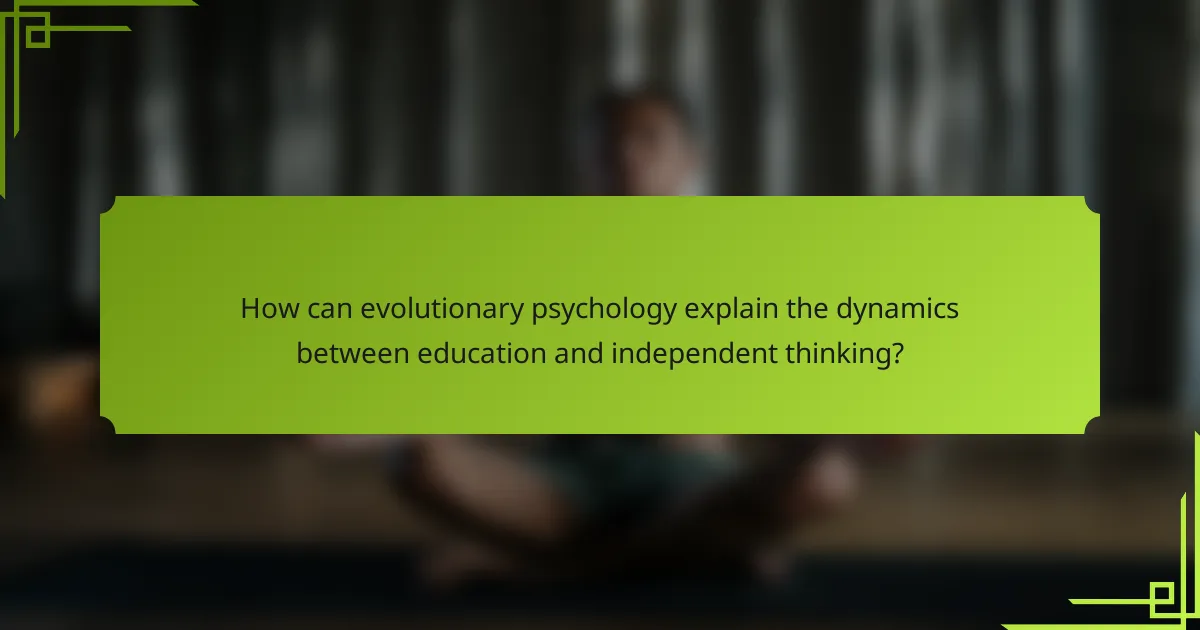
How can evolutionary psychology explain the dynamics between education and independent thinking?
Education often promotes conformity, while independent thinking fosters creativity. Evolutionary psychology suggests that cognitive development evolved to balance these dynamics. Social learning through education enhances group cohesion, yet independent thinking encourages innovation and problem-solving. The interplay between structured learning and individual thought reflects adaptive strategies for survival. Understanding these dynamics can lead to more effective educational practices that nurture independent thought while maintaining social bonds.
What evolutionary factors influence cognitive development in educational contexts?
Evolutionary factors such as environmental challenges, social interactions, and adaptive behaviors significantly influence cognitive development in educational contexts. These factors shape how individuals learn and think independently. For instance, the need for problem-solving in complex environments has driven the evolution of critical thinking skills. Additionally, social learning through collaboration enhances cognitive flexibility, allowing learners to adapt their thinking strategies. Understanding these evolutionary insights can improve educational practices by fostering environments that support independent thinking and cognitive growth.
How do evolutionary perspectives inform our understanding of independent thought?
Evolutionary perspectives highlight that independent thought is shaped by cognitive development influenced by social and environmental factors. This understanding emphasizes the role of adaptation in enhancing problem-solving skills and creativity. Cognitive flexibility, a unique attribute, emerges as individuals learn to navigate complex social dynamics, promoting independent thinking. Evolutionary insights suggest that fostering environments that encourage exploration and critical thinking can further enhance cognitive independence.
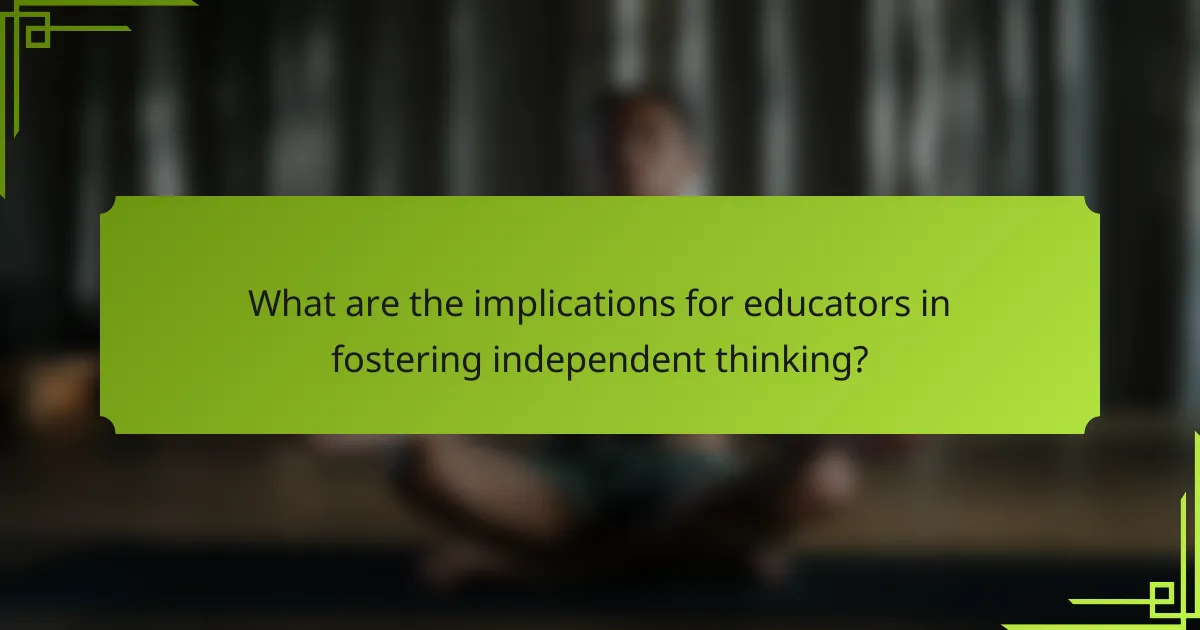
What are the implications for educators in fostering independent thinking?
Educators play a crucial role in fostering independent thinking by creating environments that encourage exploration and critical questioning. This approach enhances cognitive development and promotes lifelong learning.
To achieve this, educators should implement strategies such as promoting inquiry-based learning, encouraging problem-solving, and facilitating discussions that challenge students’ viewpoints. These methods cultivate students’ ability to think independently and develop their own perspectives.
Additionally, integrating technology can provide students with diverse resources, fostering self-directed learning. As a result, students become more adept at navigating information and forming their own conclusions.
Finally, continuous professional development for educators is essential. Training in innovative teaching methods ensures they remain effective in guiding students toward independent thinking. This commitment ultimately enhances the educational experience and prepares students for future challenges.
What best practices can educators implement to encourage independent thought?
Educators can implement various best practices to encourage independent thought. These include fostering a growth mindset, promoting inquiry-based learning, and providing opportunities for self-directed projects. Encouraging discussions that challenge assumptions helps develop critical thinking skills. Additionally, integrating real-world problem-solving tasks can enhance cognitive development and stimulate independent thinking.
What common mistakes should educators avoid when promoting independent thinking?
Educators should avoid promoting independent thinking by neglecting individual learning styles, overemphasizing rote memorization, discouraging questioning, and failing to provide constructive feedback. These mistakes hinder cognitive development and limit students’ ability to think critically. Recognizing these pitfalls allows educators to foster a more supportive environment for independent thought.
How can educators balance traditional education with independent thinking strategies?
Educators can balance traditional education with independent thinking strategies by integrating critical thinking exercises into the curriculum. This approach fosters cognitive development while maintaining foundational knowledge. Traditional methods provide structure, while independent thinking encourages creativity and problem-solving. For example, project-based learning allows students to explore concepts deeply. As a result, students develop a well-rounded skill set that enhances both academic performance and personal growth.
